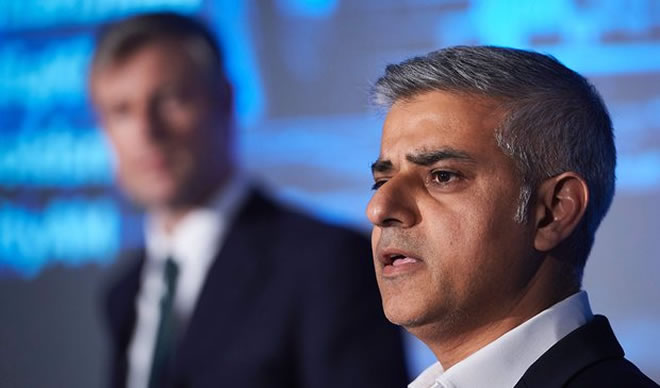The Guardian Editorial
Sunday, May 01, 2016

Rarely has the politics of Westminster appeared so remote and unattractive. The Conservatives are entirely consumed with civil war over Europe, while the last few days have produced internal spasms of an even darker kind in the Labour party. Neither parliamentary tribe appears much interested in anything much beyond settling internal scores, and certainly nothing happening beyond the shadow of Big Ben.
Just across the Thames, however, and a mere mile downstream, a new mayor for London will next week take up the reins of City Hall, and acquire real power to get real things for the Britain’s infuriating, irresistible, diverse, divided, prosperous, packed and over-priced capital. It is the fifth election for a modern mayor, since New Labour created a political office with one of Europe’s largest direct, personal mandates, and a combination of executive and legislative-style powers, which means that – in those fairly narrow fields which City Hall controls – what the mayor says goes. Sure, the London assembly keeps an eye on the head honcho, but it can’t do much more than that, and so, inevitably, the race for London has come to be a very personalised contest. Over the past two cycles, the chaotic charisma of Boris Johnson has proved decisive, and in all four past elections, the socialist swagger of Ken Livingstone loomed large. But at the end of a week in which he has disgraced himself, Londoners will be relieved that this time around they confront a choice between a fresh cast of characters.
There are many things to admire in the Green policy platform of Siân Berry, and Sophie Walker of the Women’s Equality party is giving the capital’s yawning gender pay gap and costly childcare a welcome nudge up the agenda. There might even be a case for breathing a bit of life back into London’s Lib Dems, represented by the long-time former Southwalk councillor Caroline Pidgeon, who are, in the country’s most liberal city, just as moribund as everywhere else. In the end, however, as every poll has demonstrated, next week will come down to a straight choice between two men, and every minor party supporter has a second preference, which they would be wise to use, and which will only count for anything if it is passed to Labour’s Sadiq Khan or the Conservative Zac Goldsmith.
After the long era of the Boris and Ken show, this year’s race initially promised to be a more ordinary political affair. A bright boy who worked his way up from a working-class home, who navigates his way round a few solid progressive principles with steely – and on occasions ruthless – pragmatism, Mr Khan is a very traditional London Labour figure in many respects, the one twist being that he is a child of immigrants. Mr Goldsmith is depressingly representative of the ruling clique of the contemporary Conservative party in demographic terms. Like the prime minister and the outgoing mayor, he is a white, fortysomething, who also attended the same famous boys-only school as them both, the one difference being that he was born even richer. To be fair, however, Mr Goldsmith has always ploughed his own, distinct political furrow, concentrating on the environment and initiatives to freshen up democracy. He needs to be judged, as does Mr Khan, less by his past than by what his election would mean for the future.
The biggest issue on the doorstep this time is not, as usual, transport, but instead the appalling housing shortage. Both would-be mayors are agreed that the rate of building needs to double, to 50,000 homes annually. The puffed-up property market is a very deep structural flaw in the capital’s economy, and similar promises have been made in the past and come to little. So the manifestos need to be read with a sceptical eye, but Mr Khan’s plans are somewhat more convincing – he puts more emphasis on the most pressing need of genuinely affordable homes for rent, whereas Mr Goldsmith gets distracted by schemes to provide deposits to buyers. Mr Khan has also given some thought at least to the importance of releasing land held by public authorities, including Transport for London, and his sharp elbows could be useful when it comes to cutting deals with Whitehall and the boroughs, without which nothing much will get done. The more other-worldly Mr Goldsmith projects less confidence on this score.
Mr Goldsmith has a stronger claim to be the best candidate on London’s increasingly nasty air pollution problem, even though the outgoing Conservative administration bears heavy responsibility here. His principled and consistent opposition to airport expansion makes for a flattering contrast with Mr Khan’s ticking and tacking on the question. His difficulty, however, is that his potential moral authority has been badly undermined by the divisive, sectarian tactics that have been deployed in his campaign. Words like “radical”, which are flattering in some contexts but damaging when applied to a Muslim, have been repeatedly flung at Mr Khan. Tory politicians up to and including the prime minister have damned him for meeting illiberal Muslim figures, irrespective of whether they were political allies or foes. And the Conservatives have taken to issuingsuspicious bespoke leaflets to non-Muslim minority ethnic communities.
The ultra-diverse capital of a diverse country, London has to live together before it can do anything else. The Muslim community is often the principal loser from division. Mr Khan – who has shown a resolute stance against antisemitism – holds out some prospect of healing it. Mr Goldsmith is no cartoon rightwinger, but after this campaign his victory would entrench it. London should vote, and vote enthusiastically, for Citizen Khan.